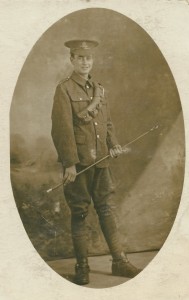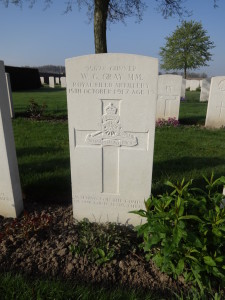 Regiment: Z 21st Trench Mortar Battery. The Royal Field Artillery
Regiment: Z 21st Trench Mortar Battery. The Royal Field Artillery
Service No: 95678
Date & place of birth: 10 May 1898 in Chichester, Sussex
Date & place of death: 15 October 1917 (aged 19) near Ypres (Ieper), Belgium
William Gray was one of two men from Cocking who earned the Military Medal awarded “for acts of gallantry and devotion to duty under fire”, when attempting to rescue an injured officer, but was killed himself later the same year.
Family background
William George Gray was born in Chichester in the spring of 1898, the second surviving son of Loveden Gray (1854–1921) and his wife Alice Lucy née Osborn (1868–1954). Loveden Gray had been born in Berkshire in March 1854, but by 1871 was living at East Marden where he was employed as an agricultural labourer. In 1884, he married Marian Osborn (born 1852) but she died of tuberculosis three years later, having lost two children as infants.
In 1891, Loveden was living in Lower Cavendish Street in Chichester, where his fellow residents were Alice and John Osborn, the children of Marian’s elder sister, Elizabeth. Loveden and Alice were married at St Mary’s Church, Portsea in February 1893 and their first son, Percy was born in August that year. The couple had eight children, of whom two died as infants, with William arriving in 1898.
In 1900, the family moved to Portland Street in Portsmouth, where Loveden was employed as a general labourer in a brewery. Within three years, the family moved again, to Eartham to the north-east of Chichester, before moving to Cocking, where Loveden was employed as a maltster, living in Crypt Lane.
The malthouse stood on the main road, just north of Crypt Lane, and produced malt for the brewery situated behind the Angel Hotel in Midhurst, run by Messrs. Parker & Popplewell. According to “A Short History of Cocking”:
The building had two floors, the barley being spread out on the top floor and heated by a furnace on the lower floor. The barley was watered until it chit, and then it was put in a dryer, and when dry, it was cracked. This practice ended about the time of the First World War, the top floor was removed and it was used as the village hall.
Despite being deaf, Loveden was a keen cricketer and was the opening bowler and batsman for the Cowdray Estate cricket XI.
Military service
William enlisted at Horsham soon after war was declared, joining the Royal Horse Artillery as a driver, later promoted to gunner in the Royal Field Artillery. His unit were sent to northern France on 28 July 1915.
In 1917, he was awarded the Military Medal with the award being recorded in the London Gazette on 9 July 1917. The medal was awarded for “acts of gallantry and devotion to duty under fire” and William earned his medal when attempting to rescue an injured officer.
Death and commemoration

William was killed in action near Ypres (Ieper) in Belgium on 15 October 1917, when a member of the Z (medium) Trench Mortar Battery with the 21st Brigade, part of the 30th Division. He was buried at Huts Cemetery at Dickebusch, south-west of Ypres. His grave bears the epitaph: “Waiting for the coming of Our Lord Jesus Christ“.
William Gray is also commemorated on Cocking War Memorial. On 23 November 1917, the West Sussex Gazette reported his death, calling him “a fine type of soldier”.
Subsequent family history
Loveden died in 1921, although his widow remained in the area until she died in July 1954.
The Angel brewery was sold to Gales of Horndean in 1923 and closed in 1927.
William’s brother, Percival went to Canada in 1912 aged 18, and joined the Winnipeg Rifles in the Machine Gun Corps. He was shot up badly in the war but survived and later returned to Sussex and died in Chichester in 1959.
Another brother, Charles joined the Royal Navy at the age of 17 in 1917 as a boy 2nd class seaman. During the Second World War, he served on the HMS Barham, and HMS Regulus, a submarine, in which he remained at sea for two and a half years. His last vessel was HMS Ringdove, on which he served as an officer. Charles died in Lewes in 1992.